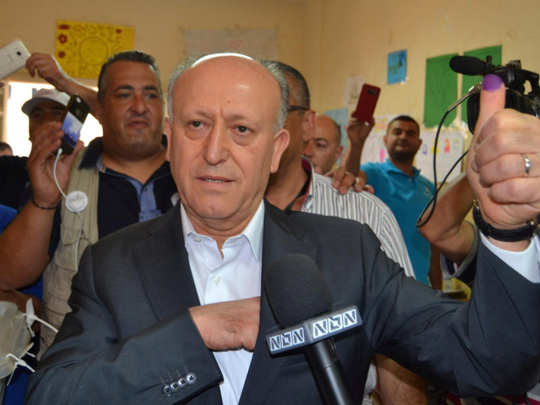
Beirut: While a victorious Justice Minister Ashraf Rifi — who emerged as a viable alternative Sunni leader — called on the Future Movement’s Sa‘ad Hariri to mend ties with Lebanese Forces (LF) chief Samir Geagea, Interior Minister Nouhad Mashnouq defended his harsh criticism of specific policies allegedly pursued by Saudi Arabia towards this country.
Mashnouq fired a series of heated statements in a televised interview on Thursday where he said that the decision to nominate Marada Movement chief MP Sulaiman Franjieh for the presidency was not ex-PM Hariri’s idea.
“The nomination did not come from Hariri but rather from the British foreign ministry and later the Americans and Saudi Arabia,” Mashnouq disclosed.
Mashnouq also said that the visit of the Future Movement chief Hariri to Damascus in 2009 and his meeting with Syrian President Bashar Al Assad happened at the request of Saudi Arabia.
The diatribes illustrated the struggle for power within the Sunni community that failed to rally its supporters and projected confusion.
Rifi pulled off an electoral victory in Tripoli from the jaws of anticipated defeat and emerged as the wiser official who correctly assessed the public mood that, increasingly, rejected establishment figures anxious to enter into secret deals.
He pleaded for a restoration of the Hariri-Geagea alliance, describing the LF as a “permanent strategic ally in the Christian arena alongside other allies”, which also upset Hariri.
Geagea pulled out his own candidacy after Hariri replaced his alliance with the LF in favour of a “transient rapprochement with former minister Sulaiman Franjieh” whom Rifi dismissed as a problematic candidate because of his ties with Syria.
The Rifi victory startled Future officials, with Mashnouq making wild assumptions that Riyadh’s policies had pushed Hariri to travel to Damascus in 2010 “to adopt a conciliatory stance with the Syrian regime … pushed the Future Movement to take the stances it had taken to get close to the Syrian line” and, in what were exceptionally conspiratorial remarks, the decision to propose the Franjieh candidacy was initially suggested by the British Foreign Office and endorsed by both Washington and Riyadh.
Although Ammar Houri, a Future deputy, asserted that Mashnouq “merely [offered] a personal analysis,” the Interior Minister refused to kowtow.
On the contrary, Mashnouq wrote on Twitter: “It is true I don’t represent the Future [Movement] in what I [previously] said, but my words represent the hidden conscience of the movement,” before he continued: “It is time to say the facts as they are without any ambiguity.”
London and Washington denied Mashnouq’s allegations and the Saudi Ambassador to Lebanon, Ali Awad Asiri, strongly criticised the minister’s remarks, saying that the Kingdom pursued a steady policy — not to interfere in internal Lebanese affairs.
The embassies of the three countries refuted Mashnouq’s claims, as representatives from all three chancelleries reiterated calls on Lebanese rivals to end the power vacuum that prevented the election of a president.
President Michel Sulaiman left office on May 24, 2014.
Remarkably, it fell on Rifi to offer a correct evaluation of the latest municipal elections, which witnessed sharp rejections of all established political parties (both Muslim as well as Christian), in favour of nascent civil society movements.
Rifi confirmed that he intended to form a coalition with “forces seeking change” in upcoming parliamentary elections, if any were held in 2017, although chances are excellent that elites who stood to lose big would opt to extend parliament’s term for a third time in a row.
Beyond election results and Rifi’s surprise victory, what irritated Mashnouq was the affable Justice Minister’s bold calls on Future Movement representatives to “rectify the course and endorse policies that take the opinion of the Sunni community into consideration, in order to avoid its descent towards extremism”.












